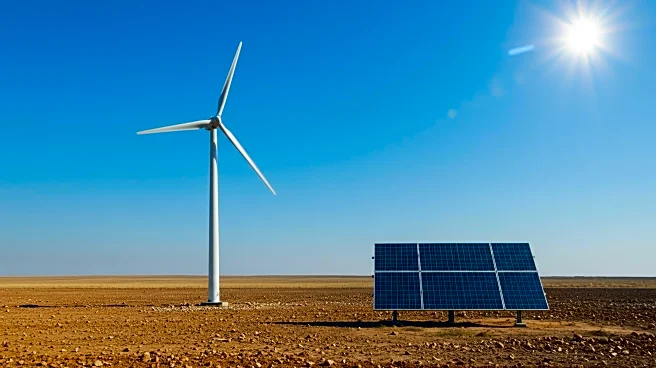What's Happening?
President Trump announced that his administration will no longer approve solar or wind power projects, despite increasing electricity demand in parts of the U.S. This decision follows the administration's recent tightening of federal permitting for renewable energy projects, centralizing the process under Interior Secretary Doug Burgum. Renewable energy companies are concerned that projects will face significant hurdles in obtaining permits, which were previously routine. Trump has criticized renewables for contributing to rising electricity prices, particularly on the PJM Interconnection grid, which covers 13 states. The administration's One Big Beautiful Bill Act aims to terminate investment and production tax credits for wind and solar by the end of 2027, a move that could hinder the growth of renewable energy in the U.S. Additionally, tariffs on steel and copper have increased costs for solar and wind projects.
Why It's Important?
The decision to halt approvals for solar and wind projects could have significant implications for the U.S. energy sector, particularly as demand for electricity continues to grow. Renewable energy sources like solar and battery storage are crucial for addressing the supply-demand gap, as they represent a large portion of projects waiting to connect to the grid. The termination of tax credits and increased costs due to tariffs may slow the expansion of renewables, potentially affecting the country's ability to transition to cleaner energy sources. This policy shift could benefit traditional energy industries such as coal, oil, and natural gas, which continue to receive federal support. However, it may also lead to higher electricity prices and increased reliance on fossil fuels, impacting efforts to reduce carbon emissions.
What's Next?
Renewable energy companies are likely to seek alternative strategies to navigate the new regulatory landscape and continue their projects. Industry stakeholders may increase lobbying efforts to reverse or mitigate the impact of these policies. The administration's stance could prompt legal challenges or legislative actions from environmental groups and states that prioritize renewable energy development. Additionally, the decision may influence future energy policy debates and the direction of U.S. energy infrastructure investments.
Beyond the Headlines
The administration's approach to renewable energy raises questions about the long-term sustainability of U.S. energy policy and its alignment with global climate goals. The emphasis on traditional energy sources may conflict with international efforts to combat climate change and transition to cleaner energy. This policy shift could also affect the U.S.'s position in the global renewable energy market, potentially ceding leadership to other countries that continue to invest in solar and wind technologies.


![Daily Slop: 12 Feb 26 – New Commanders OC David Blough: “How do we get Terry [McLaurin] 10 targets a game?“](https://glance-mob.glance-cdn.com/public/cardpress/binge-magazine-card-generation/spaces/US/en/sb-nation/images/ppid_2cf3d240-image-177091266842313096.webp)






